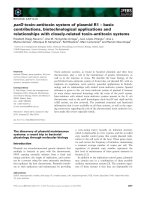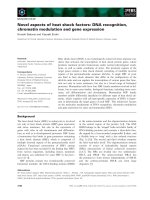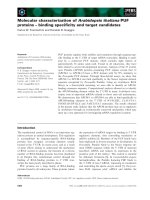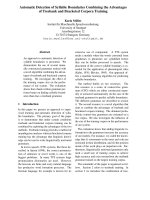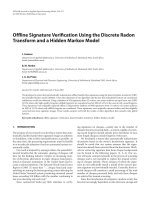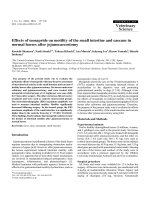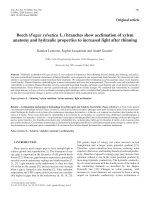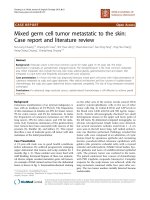báo cáo khoa học: " Ovarian cryopreservation after laparoscopic ovariectomy using the Endo-GIA stapling device and LAPRO-clip absorbable ligating clip in a woman: a case report" ppt
Bạn đang xem bản rút gọn của tài liệu. Xem và tải ngay bản đầy đủ của tài liệu tại đây (368.69 KB, 3 trang )
CAS E REP O R T Open Access
Ovarian cryopreservation after laparoscopic
ovariectomy using the Endo-GIA stapling device
and LAPRO-clip absorbable ligating clip in a
woman: a case report
Isabelle Roux
1
, Michaël Grynberg
1,2
, Jenna Linehan
1
, Alexandra Messner
3
, Xavier Deffieux
1,2,4*
Abstract
Introduction: Several options are available for preserving fertility before cytotoxic treatment, including ovarian
tissue cryopreservation. Most reported surgical techniques include electrocoagulation. Our hypothesis is that
avoidance of electrocoagulation may decrease ovarian cortex injury during cryopreservation procedures.
Case presentation: We report a laparo scopic technique of whole-ovary removal without coagulation using
Endo-GIA forceps and clips. Laparoscopic ovariectomy was performed for cryopreservation in a 37-year-old
Caucasian woman with breast cancer and for whom chemotherapy was planned. The procedure was completed
quickly and without complication. This Endo-GIA procedure was of short duration with a short period of ischemia
before freezing.
Conclusion: Laparoscopic ovariectomy using the Endo-GIA stapling device procedure without coagulation may
diminish ovary injury before ovarian cryopreservation.
Introduction
Several options are available for preserving fertil ity
before cytotoxic treatment, n amely embryo cryopreser-
vation, oocyte cryopreservation and ovarian tissue cryo-
preservation. Embryo cryopreservation results in good
pregnancy rates, but the patient needs to be of pube rtal
or postpubertal age, have a partner and be able to
undergo a cycle of ovarian stimulation [1]. Ovarian sti-
mulation is not possible when chemotherapy cannot be
delayed or when stimulation is contraindicated. Ovarian
tissue transplantation after cryopreservation is an option
despite being an experimental technique with few live
birt hs reported [2]. Either a part of cortical tissue [3] or
whole ovary can be removed.
Case presentation
We report a laparoscopic ovariectomy technique per-
formed for cryopreservation in a 37 year-old Caucasian
woman with breast cancer and for whom chemotherapy
was planned. Despite being informed of the poor outcome
in women of her age, this woman elected to undergo com-
bined techniques for fertility preservation. As an adjuvant
to the tissue pres ervation, immature oocyte retrieval was
performed one day before the surgery. During laparoscopy,
the ureter and the iliac vessels were identified. Through
the medial 12-mm trocar, the Endo-GIA Roticulator
(Tyco Healthcare, Covidien, Elancourt, France) was used
to cut the infundibulopelvic ligament and mesovarium
(Figures 1 and 2). The utero-ovarian ligament was then
clamped with two vascular absorbable clips (Figure 3).
The removed ovary was immedi ately handed ove r to a
biologist team that was present in the operating room. No
complications were reported from this procedure. Pathol-
ogy revealed “normal” ovarian tissue. Our hypothesis is
that avoidance of electrocoagulation may decrease ovarian
cortex injury during cryopreservation procedure. There
are no precise data demonstrating that electrocoagulation
causes damage to the ovarian tissue in the course of ovar-
ian tissue harvesting and cryopreservation. However, many
experimental studies have shown that electrocoagulation
* Correspondence:
1
AP-HP, Service de Gynécologie-Obstétrique et Médecine de la
Reproduction, Hôpital Antoine Béclère, Clamart, F-92141, France
Full list of author information is available at the end of the article
Roux et al. Journal of Medical Case Reports 2011, 5:48
/>JOURNAL OF MEDICAL
CASE REPORTS
© 2011 Roux et al; licensee BioMed Central Ltd. This is an Open Access article distributed under the terms of the Creative Commons
Attribution License ( which permits unrestri cted use, distribution, and reproduction in
any medium, prov ided the original work is properly cited.
(monopolar and bipolar energies) may be associated with
damage to o varian tissue. For example, ovarian drilling,
especially bipolar electrocoagulation, causes extensive
destruction of the ovary [4]. Furthermore, some data sug-
gest that bipolar electrocoagulation of the ovarian par-
enchyma during laparoscopic ovarian cystectomy
adversely affects ovarian func tion [5, 6]. Thes e data show
possible impact of electrocoagulatory ovarian tissue
damage on the outcome of ovarian tissue harvesting and
reimplantation. Further studies should assess ovarian tis-
sue damage and the results of ovarian cryopreservation
according to the ovarian removal procedure (Endo-GIA
vs. electrocoagulatory).
This Endo-GIA procedure was of short duration wit h
a short period of ischemia before freezing. Furthermore,
it is known that the Endo-GIA stapling device requires
sig nificantly less time than electr ocoagulation [7]. How-
ever, some centers do not remove a whole ovary for
ovarian tissue cryopreservation; instead, they remove
only half to two-thirds of one macroscopically normal
ovary’s cortex. The Endo-GIA removal procedure can-
not be used in these cases.
Conclusion
Laparoscopic ovariectomy using the Endo-GIA stapling
device procedure without coagulation is an optional
ovariectomy technique that should diminish ovary injury
before ovarian cryopreservation.
Consent
Written informed consent was obtained from the patient
for publication o f this case report and accompanying
images. A copy of the written consent is available for
review from the Editor-in-Chief of this journal.
Author details
1
AP-HP, Service de Gynécologie-Obstétrique et Médecine de la
Reproduction, Hôpital Antoine Béclère, Clamart, F-92141, France.
2
Univ Paris-
Sud, Faculté de Médecine Paris Sud, Le Kremlin Bicêtre, F-94275, France.
3
AP-
HP, Department of Reproductive Biology, Antoine Béclère Hospital, Clamart,
F-92141, France.
4
ER6, UPMC, Paris, F-75013, France.
Authors’ contributions
Each author participated sufficiently in the work. IR, XD and MG performed
surgical procedure and analyzed and interpreted the patient data regarding
the surgical management. JL and AM performed the ovarian
cryopreservation and were major contributors in writing the manuscript. All
authors read and approved the final manuscript.
Competing interests
The authors declare that they have no competing interests.
Received: 22 April 2010 Accepted: 3 February 2011
Published: 3 February 2011
References
1. American Society for Reproductive Medicine, The Practice Committee of
the American Society for Reproductive Medicine and the Practice
Committee of the Society for Assisted Reproductive Technology: Ovarian
tissue and oocyte cryopreservation. Fertil Steril 2008, 90(suppl):S241-S246.
2. Donnez J, Dolmans MM, Demylle D, Jadoul P, Pirard C, Squifflet J, Martinez-
Madrid B, Van Langendonckt A: Livebirth after orthotopic transplantation
of cryopreserved ovarian tissue. Lancet 2004, 36:1405-1410.
Figure 1 The Endo-GIA Roticulator is used to cut the
infundibulopelvic ligament and mesovarium.
Figure 2 Cutting the mesovarium using the Endo-GIA stapling
device.
Figure 3 Clamping the utero-ovarian ligament using vascular
absorbable clips.
Roux et al. Journal of Medical Case Reports 2011, 5:48
/>Page 2 of 3
3. Meirow D, Fasouliotis SJ, Nugent D, Schenker JG, Gosden RG, Rutherford AJ: A
laparoscopic technique for obtaining ovarian cortical biopsy specimens for
fertility conservation in patients with cancer. Fertil Steril 1999, 71:948-951.
4. Hendriks ML, van der Valk P, Lambalk CB, Broeckaert MA, Homburg R,
Hompes PG: Extensive tissue damage of bovine ovaries after bipolar
ovarian drilling compared to monopolar electrocoagulation or carbon
dioxide laser. Fertil Steril 2010, 93(3):969-75.
5. Fedele L, Bianchi S, Zanconato G, Bergamini V, Berlanda N: Bipolar
electrocoagulation versus suture of solitary ovary after laparoscopic
excision of ovarian endometriomas. J Am Assoc Gynecol Laparosc 2004,
11(3):344-347.
6. Li CZ, Liu B, Wen ZQ, Sun Q: The impact of electrocoagulation on ovarian
reserve after laparoscopic excision of ovarian cysts: a prospective clinical
study of 191 patients. Fertil Steril 2009, 92(4):1428-1435.
7. Sharp HT, Dorsey JH, Holtz PM, Melick CF: Electrocoagulation versus the
Endo GIA in LAVH. J Am Assoc Gynecol Laparosc 1996, 3(4 suppl):S45-S46.
doi:10.1186/1752-1947-5-48
Cite this article as: Roux et al.: Ovarian cryopreservation after
laparoscopic ovariectomy using the Endo-GIA stapling device and
LAPRO-clip absorbable ligating clip in a woman: a case report. Journal
of Medical Case Reports 2011 5:48.
Submit your next manuscript to BioMed Central
and take full advantage of:
• Convenient online submission
• Thorough peer review
• No space constraints or color figure charges
• Immediate publication on acceptance
• Inclusion in PubMed, CAS, Scopus and Google Scholar
• Research which is freely available for redistribution
Submit your manuscript at
www.biomedcentral.com/submit
Roux et al. Journal of Medical Case Reports 2011, 5:48
/>Page 3 of 3

